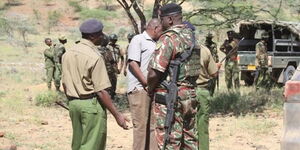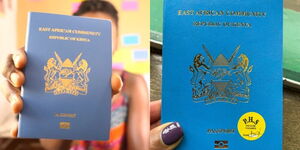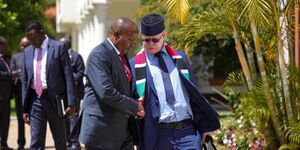Kenyans on Wednesday woke up to reports that Joseph Irungu, also known as Jowie, who was convicted over the slaying of businesswoman Monica Kimani, had been released.
Talk about his release first emerged on Tuesday evening following a gazette notice dated Friday, May 23, in which President William Ruto exercised his Constitutional right of prerogative of mercy by releasing 57 inmates.
Among those pardoned by the Head of State was an individual, Joseph Irungu Maina. The name prompted mixed reactions from Kenyans, with some claiming that Ruto could have released Monica's alleged slayer.
However, Digital Strategist and Head of Creative Economy at the Office of the President, Dennis Itumbi, was swift to dismiss the allegations, terming the social media claims as fake.
Itumbi went ahead to accuse a section of online users of attempting to hoodwink the public by sharing misleading information regarding such a sensitive matter.
A spot check conducted by Kenyans.co.ke established that Joseph Irungu, who was sentenced to execution last year over the brutal slaying of the businesswoman, was not the one released by the Head of State.
Notably, the difference in the names came out as one distinct feature. Despite close similarity in names, our research established that Monica Kimani's slaying was by Joseph Kuria Irungu and not Joseph Irungu Maina.
Another defining trait was the difference in the dates of sentencing. Joseph Irungu Maina, listed as prisoner 22, was sentenced 10 years ago, in 2015, according to the aforementioned gazette notice.
On the flip side, Joseph Kuria Irungu was sentenced to execution on March 13, 2024, by Lady Justice Grace Nzioka, who found Jowie guilty of killing Monica Kimani.
While delivering the judgement, Judge Nzioka said the sentencing was the appropriate punishment considering the weight of the offence and the circumstances under which the offence was committed.
Circumstances for Presidential Pardon
In the 2010 Constitution, a prisoner can be released by the Head of State under the power of mercy by granting them a pardon. The president makes such a decision based on the advice he receives from the Power of Mercy Advisory Committee.
Kenya adopted the power of mercy from the United Kingdom, where it existed as a royal prerogative of mercy that was originally used to permit the monarch to withdraw or provide alternatives to execution sentences.
The prerogative of mercy was extended to the Kenyan president by the British colony and fully adopted after the country gained its independence.
According to the law, the Head of State may exercise the prerogative of mercy to an inmate who has shown good behaviour, which encourages others to change their behaviour as well.
It can also be exercised for humanitarian purposes, for instance, when a person is pregnant, insane or young. Thirdly, if a person was convicted under laws which were considered repressive or draconian.
Also, there are instances where a person may breach the law and their situation attracts public sympathy, the person could be pardoned by the Head of State.
The power of mercy can also be used to repair diplomatic relationships. One country may demand the release of their national, prompting the host country to do so through the approval of the president.












